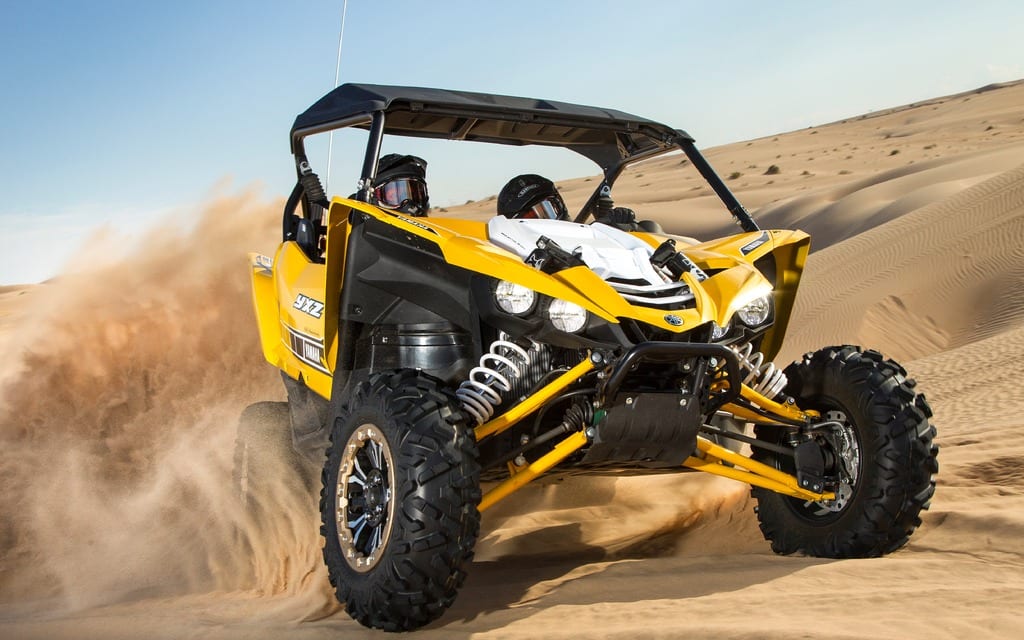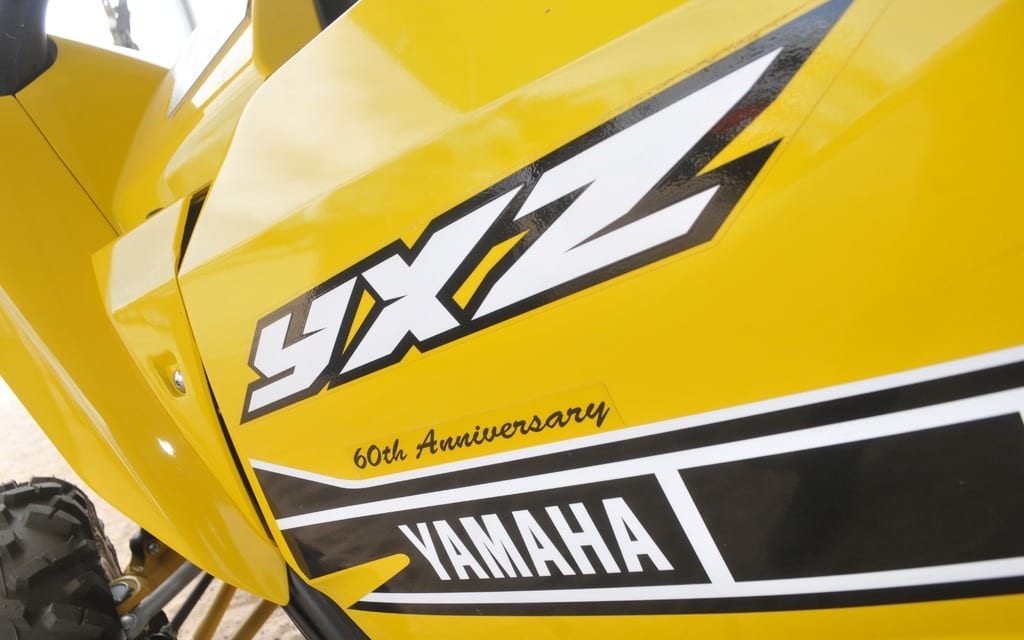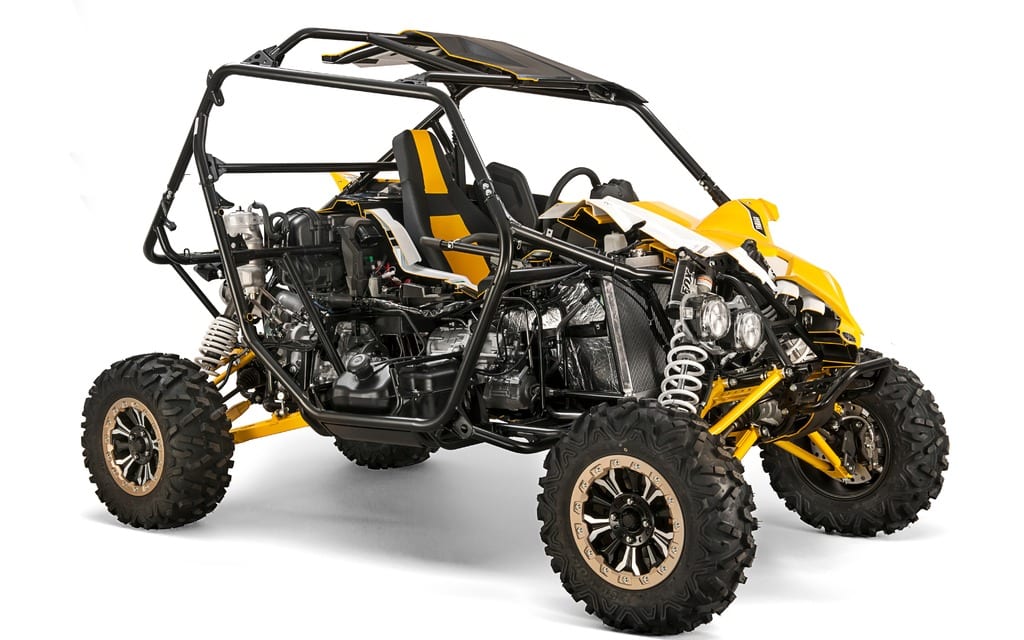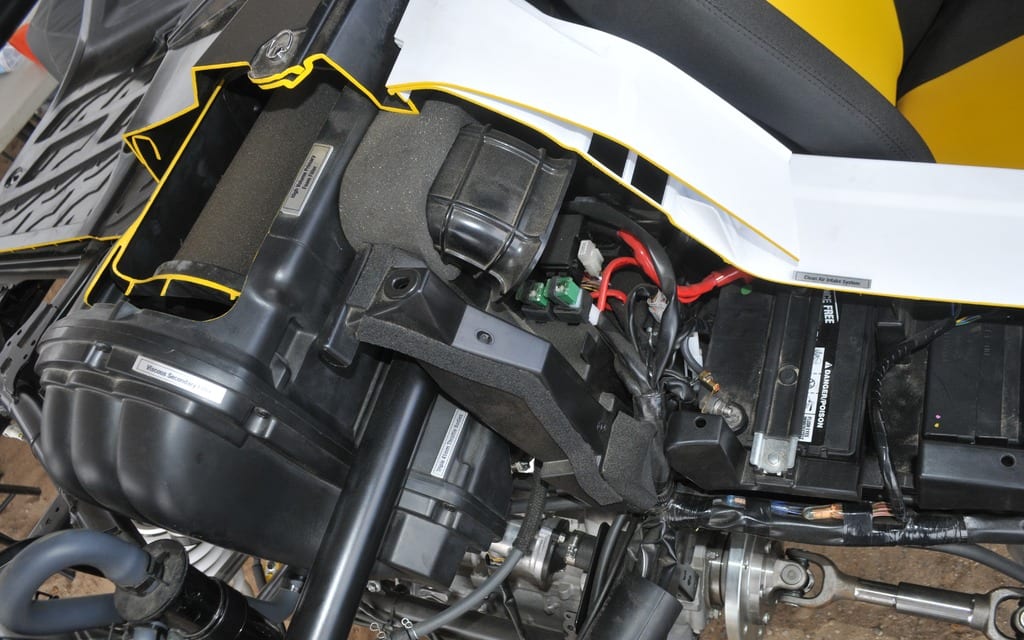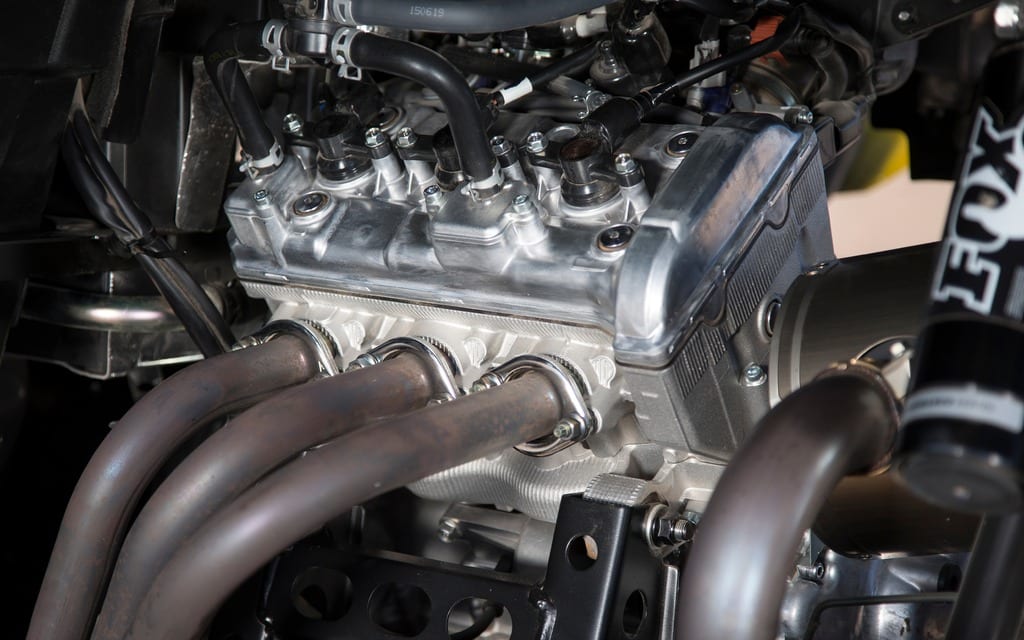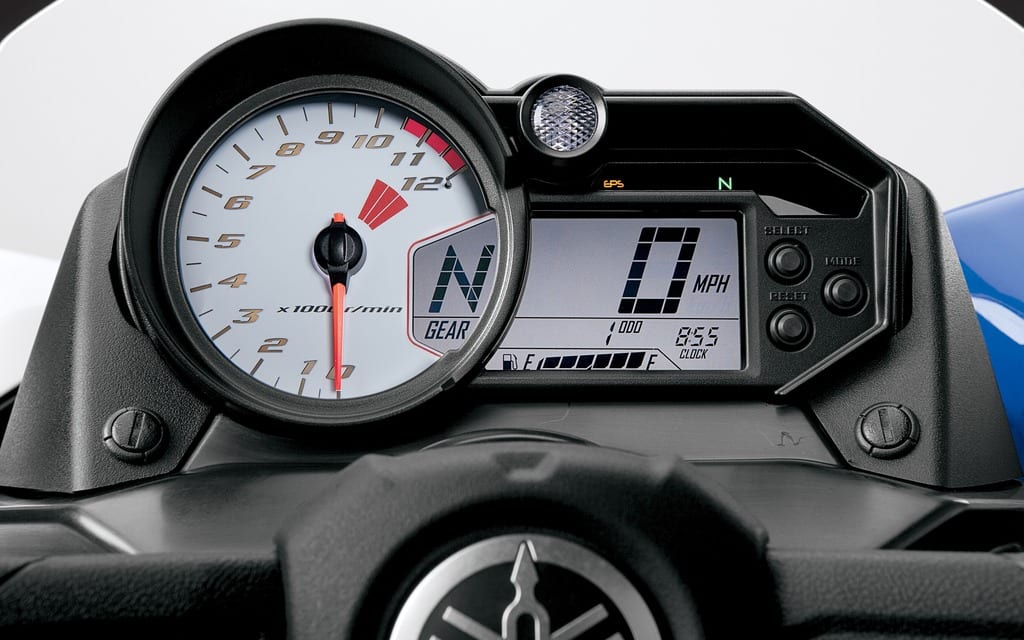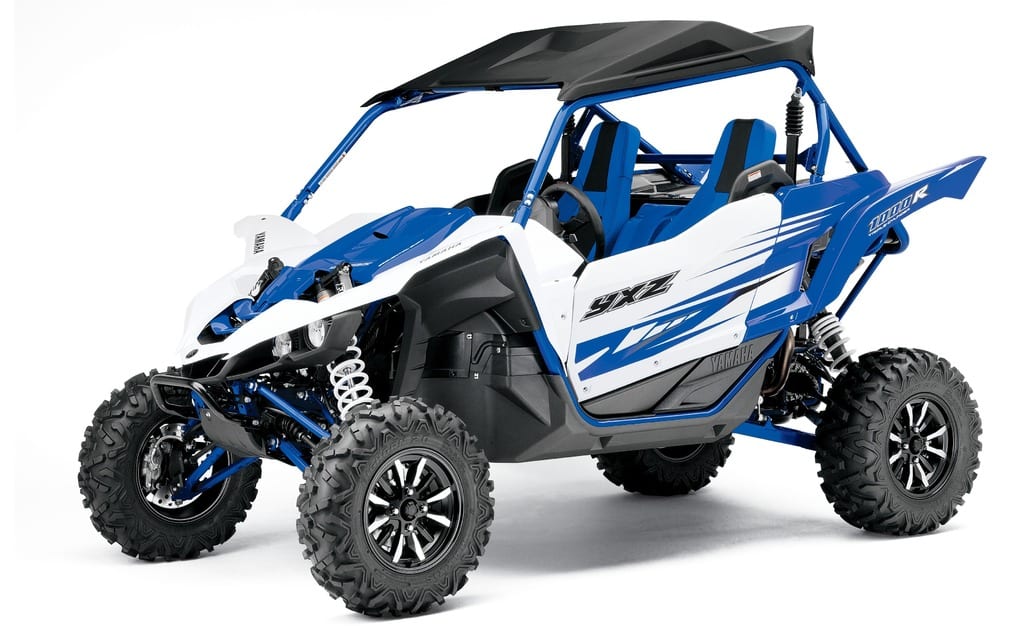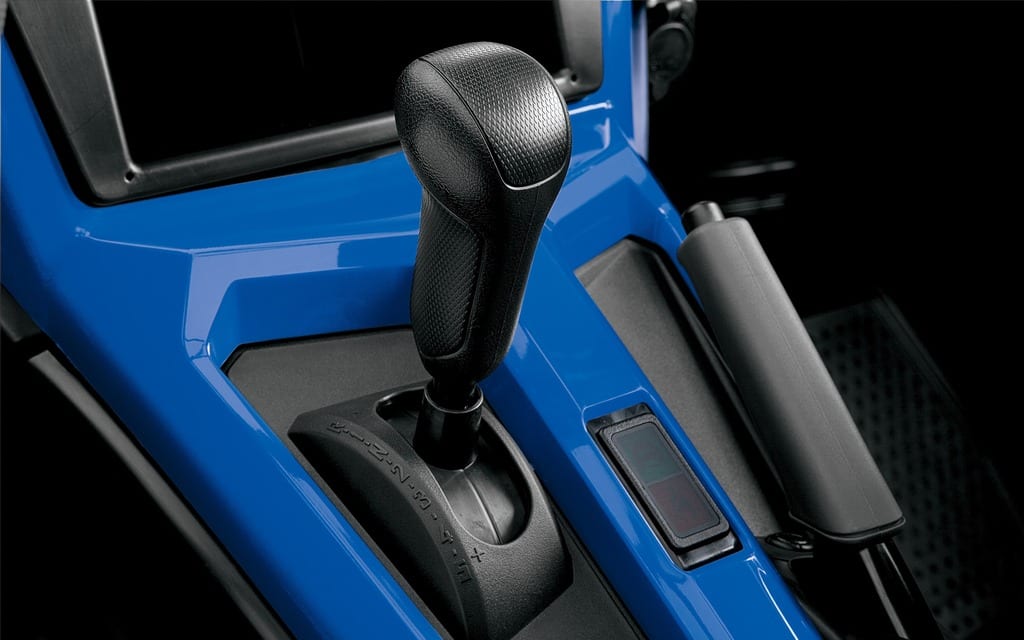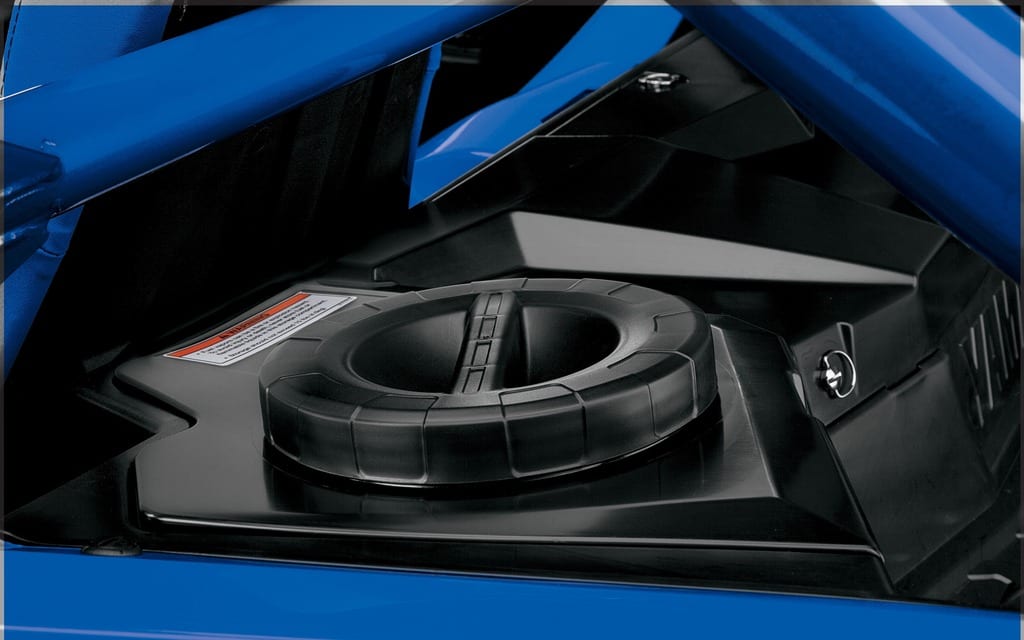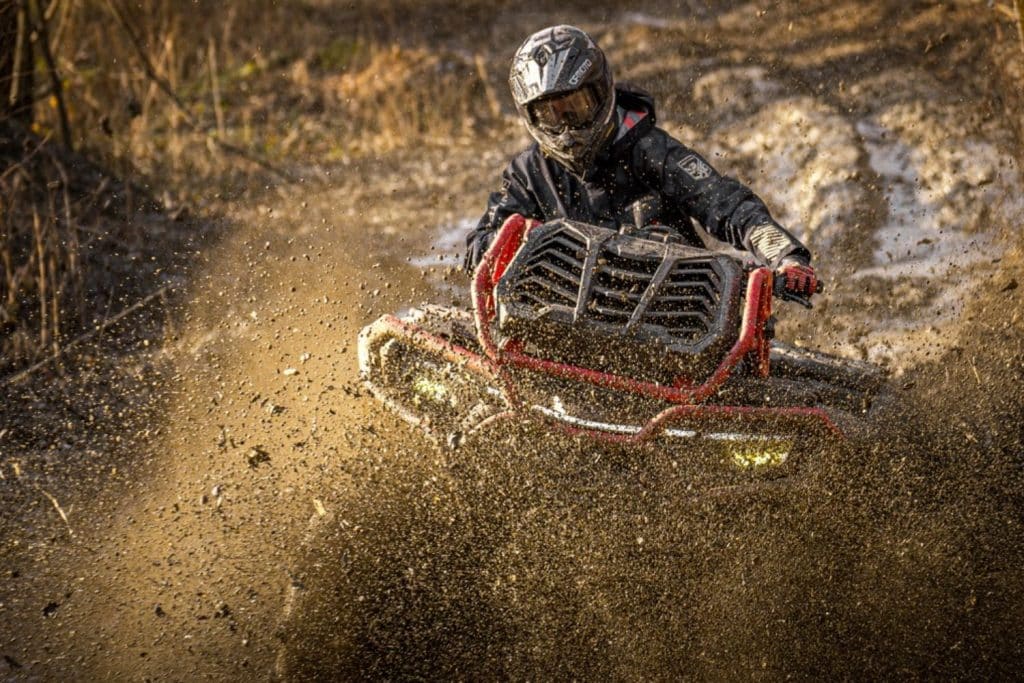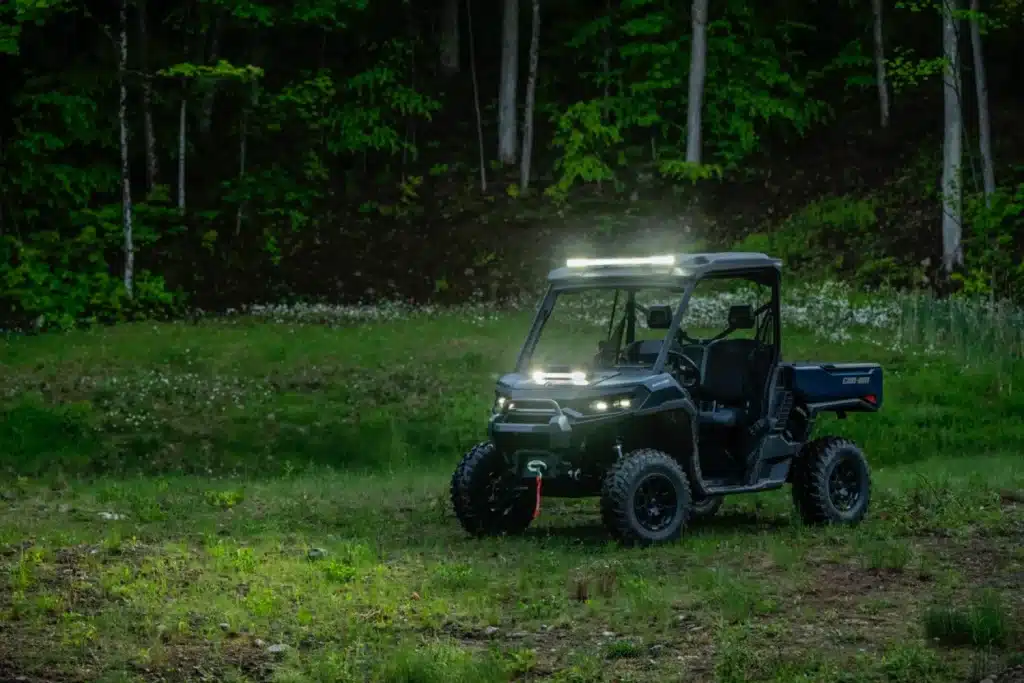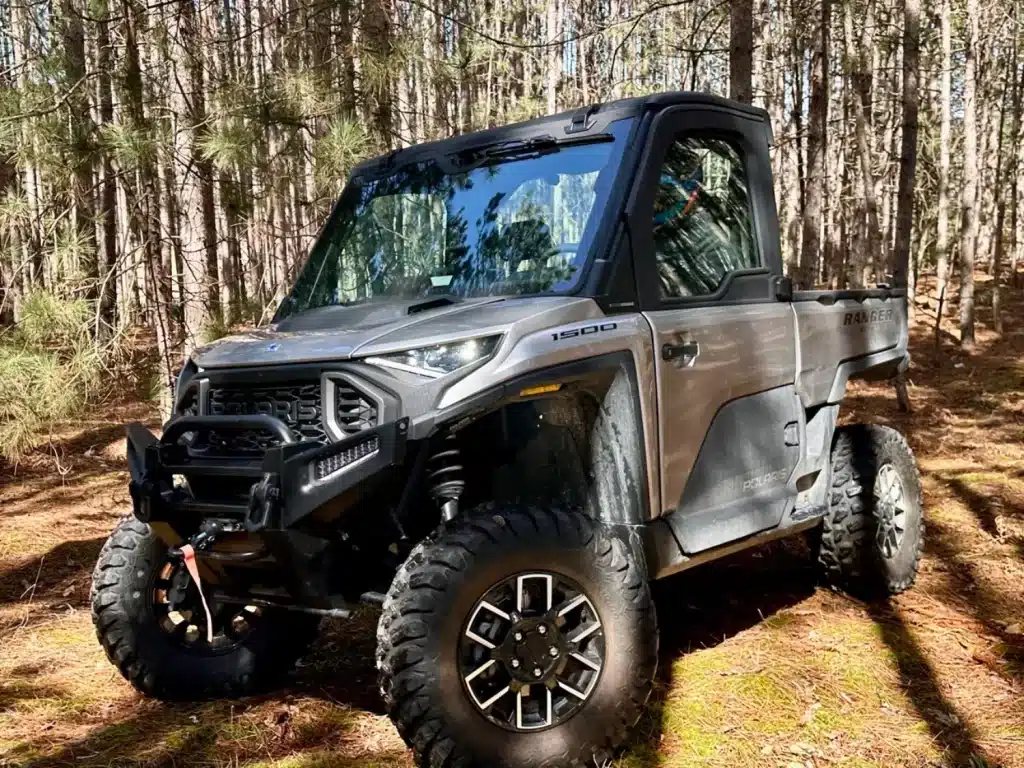It’s not just the fact that it has a manual transmission, not just that it has a nice tiny and smooth to click sequential gear shifter, nor because it sounds a lot more like a powerful sport motorcycle than an ATV. It is all of those things combined with a lot more, that brought the fun factor way off the charts, during our short but mind-boggling cool first drive of this new off-road dream come true at Glamis.
This all-new 998 cc, triple cylinder powered Pure-sport (which although nothing official is being said, we’ve heard makes 110 HP or so) has plenty of low and mid-range torque, but its high 10,500 rpm redline is what impressed me most. Imagine it! The RPM looks exactly like what you would find in a race car: BIG, boldly clear thanks to its basic written numbers on a bright white background. There’s a shift light that you can adjust to the desired RPM! I’m in need of some pinching, once again. Heaven just has to have one of these parked with an opened driver’s side door near its gates.
I was totally impressed with the way Yamaha’s numerous representatives presented this new product to us. Their presentations were complete and highly informative. Having a full unit in cutaway spending the whole day with us at camp was the icing on this delicious cake! Also sweet was the fact that we were going to try this vehicle in SE form, highlighted by a stunning 60th Anniversary Yellow and Black graphics package with matching A-arms and rolling on durable bead-lock wheels wrapped with 27-inch Maxxis Bighorn 2.0 radial tires developed exclusively for Yamaha. Massive FOX RC2 suspension units punch through the hood, which not only makes it look really mean but imagine all of that air up front constantly cooling their piggyback fluid containers; surely it will help avoid fading in real desert racing situations. This front suspension design also permits an extremely low hood line for excellent trail visibility.
With dual-speed compression adjust, rebound adjust, and bottom-out control, these FOX 2.5 Podium RC2 shocks offer less fade, a plusher ride, and can take on huge hits. They feature Bottom-Out Control, a genuine Kashima coated aluminum body and reservoir, 5/8″ hard-chromed shaft, 3.0″ ID dual rate race spring, hi-flow precision manufactured damping piston and aerospace-grade Teflon-lined spherical bearings. Tuned for race, dune, trail or desert terrain, they are fully rebuildable, serviceable and revalveable. This means that you can fine-tune your ride and handling to suit your exact personal preference and terrain. Your 2016 Yamaha YXZ1000R will provide you with 16-inches of travel at the front and 17 inches at the rear, plenty to take on just about anything mother nature can throw in front of you, while anti-sway bars for both front and rear work with a linear wheel stroke to provide the best all-around handling I’ve ever felt in a Side-by-Side.
The bottom-out control valve provides position-sensitive end stroke damping; this allows for a seamless transition from small bumps to big drop bottom-outs. The results of my very fast test through a series of whoops, almost never-ending on our way back along the big fence outlining the Mexican border, was that the faster I went, the more confident I would become. To put it simply, this machine wanted a racetrack and these dunes were just not doing it full justice.
There are elements to consider when owning a vehicle with such an advanced high-performance set of shocks. After every ride you should clean the exterior of your shocks with mild soap and water only; then wipe-dry with a soft towel. Avoid the shocks when cleaning the rest of the ride with a high-pressure washer. Try not spray water directly on the seal/shock body junction. If you ride in extreme conditions, you should service your shocks more frequently.
The very first time I sat in the 2016 Yamaha YXZ1000R I was pleased with every detail, I stopped and paid close attention to. My seat was not only superbly comfortable but wrapped nicely around me, the thick hollow plastic side protection panels were reassuring, the steering wheel felt like I was about to drive a Supercar and please thank the maker, for there was nothing threatening to hurt the side of my knee on the door.
I chose a unit parked behind guys I knew to be great drivers. Sorry but I wasn’t going to just trot around in this awesome new take on what a pure sport Side-by-Side should really be like. I’ve had my chance to become what you could call an expert, driving almost every Side-by-Side ever made and still getting the opportunity to ride or race many different Polaris RZR models, I got this!
At the end of my first of many times out on that glorious day, on the last flat stretch back to base camp, I kept my dream Yamaha at its maximum right up to fourth gear, waiting for the shift light and power shifting into 5th. I was launched into another mindset, where my brain was on the edge of overloading just trying to spot every imperfection and it takes a keen eye to judge the size of each and every one of them under a bright mid-day sun. Waiting for that 10,000 + RPM meant that the 5th gear didn’t feel like an overdrive used to cruise and save fuel, like it did so well on very few occasions that day. It only took about 5 seconds for it to bring me to the vehicle’s top speed of 80 mph (128.7 kph). It was just a one-time thing; we do it, so you don’t have to type of deal. It was a cool five seconds but I had way more fun playing with the 2nd and 3rd gear in tighter stuff all day. The clean air intake is mounted centrally and high so that it gets a maximum amount of clean air but many other models still get dust in their air system after a ride in the dunes despite the same type of effort. I just had to know, so right away after our morning ride, which represented for me anyway about three hours of desert race pace driving, I looked for a drain at the bottom of the air box and found it quickly. I squeezed the rubber tip; nothing came out. Thumbs up! The Maverick turbo I had recently tested at the same location had dropped about a quarter cup of sand. This Yamaha’s air is filtered through a dual element air filter that allows for longer maintenance intervals and is easy to clean out in the field.
Once again I can’t help but mention how much safer such a vehicle can be than any other when driven in a relaxed fashion at normal speed. Every enhanced for high performance element, translates into a safer feeling experience when coming across more challenging bits of trail. I can picture any couple of any age thoroughly enjoying the extra comfort and peace of mind those elements bring. This is where the availability of a Rekluse clutch on this machine becomes very interesting to mention as well. This wonderful add-on takes the tricky part of operating a manual transmission, out of the equation. Rekluse auto clutches feature centrifugally-driven anti-stall technology providing the ability to take off and stop in gear without using the clutch pedal. It can also improve your experience during low speed/technical maneuver. The Rekluse clutch allows you to manually push in your clutch pedal and use it normally.
Remember that this is just their entry model into this exciting new world. The whole platform looked and felt like it could take on much more and handled so well that I would be comfortable with even more power. Still, I was left perplexed as to why anyone would want more than this thing provides but for the wildest among us there’s already a few turbo kits available, This motor only requires 5 psi of boost to make over 150HP. Competitive vehicles require much higher boost levels. MCI’s “Turn Key” Turbocharger kit at $3,995.00 US dollars promises 150HP. They also say that higher HP variants & upgrades will soon be available. Watch out! They have been producing extreme performance variants for this motor exceeding 300HP! This 3-cylinder motor’s performance and capabilities have been their specialty since 2005. This is the 7th generation of this type of multi-cylinder engine and the 4th generation of this particular 3-cylinder design. MCI have produced products for all 7 generations. Hum tough call…Wait and see if Yamaha comes out with its own turbo a little later? Or just go for it all right now. Honestly, I think 99% of us would, should and could settle for what this toy offers off the shelf and still end up in la la land, without even having to know what the word turbo means. The engine offers jaw-dropping power and fantastic mid-range torque as is. With lightweight 80mm forged aluminum pistons and a counterbalance, it is also exceptionally smooth-running. The compact DOHC twelve-valve cylinder head, an aggressive 11.3:1 compression ratio and high-tech dry-sump lubrication, combined to offer clients high but also reliable off-road performance. To place the engine as low as possible in the chassis for a lower centre of gravity, they did away with the idea of having a bulky oil pan on the underside of an engine and put an oil reservoir high up behind the passenger. I love the idea but feel that the oil lines going to and from it, should be better protected.
The transmission is what is really changing the game here. The new five-speed sequential transmission designed specifically for this application is a constant mesh design with reverse, equipped with a torque limiter and a 21-plate hydraulic clutch. Power is transferred to the front and rear differentials via single-piece drive shafts so there is no lag felt at all in the transfer of power and it was truly making this vehicle feel like it had a lot more horsepower. It also features Yamaha’s On-Command system which allows the driver to switch through 2WD, 4WD and 4WD with Differential Lock at the turn of a dial easy to spot and reach on the dash. The reverse gear is easy to engage via a small lever behind the steering wheel on the left. Yamaha also uses a hydraulic clutch with a torque limiter to absorb shocks generated by the vile engine.
The third gear quickly became my favourite of the five. It felt like I could leave it there all day long and still have a whole lot of fun. I then took a liking to the transition from third to fourth gear, shifting it at around 10,000 RPM. Wow! I’m stomped, simply can’t seem to describe the true feel of this ride by hitting keys on a keyboard. I feel bad that I can’t just grab any of you and sit you next to me in one of these right now. Another fun thing was dropping to 2nd and throwing the back end out on the top edge of a dune, an aggressive move that should be left to experts for sure, but more doable safely with this ride than with any other. The lack of power loss through its very direct and solid driveline, meant quicker transfer of power than with any CVT and made it possible for me to break through the rear tire side grip, that occurs at different levels yet always, when compressing sand as you turn. The result is what you see on the cover shot of this issue of ATV Trail Rider magazine, which I should normally warn not to imitate but I’m becoming perplexed by the fact that on many occasions when I make decisive choices and moves with any 64 inch wide Side-by-Side, it feels safer and smoother than when approached with hesitation. When it comes to pure fun factor, nothing will compare to the new 2016 Yamaha YXZ1000R and its center-mounted state-of-the-art manual transmission. Polaris CVTs are pretty good, they have had lots of time to work on them but it wouldn’t be surprising to see them also offer a manually shifted RZR in a near future. Their new Slingshot, a 3-wheeled open-air cockpit roadster has a manual 5-speed transmission. Hum…a GM sourced powertrain turning out 173 horsepower is quite a bit for a vehicle that weighs less than 1800 pounds and has one drive wheel. It might just be perfect for a Pure-sport Side-by-Side.
If you want the utmost in performance and durability and have lots of wide-open spaces to play in, going for this new Yamaha is a no-brainer. Even if this is the first year for this model, we feel very comfortable in encouraging any off-road fan to buy one. Yamaha machines are legendary for quality and longevity, they’re known to come with a high level of peace of mind and excellent dealer support. Yamaha’s products are expected to just go and go without failures and we at ATV Trail Rider magazine can honestly say that we have never had even a hint of a mechanical problem with any Yamaha.
You clearly did your homework Yamaha. Thanks for an absolutely awesome machine!
For more information on the above mentioned models, please visit the Yamaha Motor Website
More from Yamaha on ATV Trail Rider :
Yamaha ATV Models – Yamaha UTV Models – Yamaha ATV Reviews – Yamaha UTV Reviews


